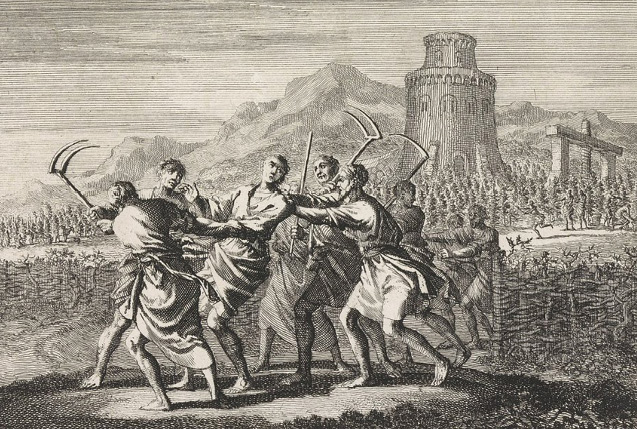A sense of entitlement is a corrosive cancer which blinds the soul to the goodness of our Lord and leads to a wide range of sin. In the Parable of the Wicked Vinedressers (Mathew 21:33-46), the tenants’ assumption of squatting rights results in manifest murder.
Fully furnished with wall, tower, and winepress, the landowner has developed his acreage into prime real estate. The intricate details mirror Isaiah’s familiar metaphor of God’s boundless grace toward Israel: “What more could have been done to My vineyard that I have not done in it?” (Isaiah 5:4)

God had provided Moses’ laws as a wall which identified them as His people, the line of David as a tower of temporal protection, and the winepress-promise of a Messiah to save from sin and death. Without peering into too much detail, there is no doubt that this rich rock edifice is the “refuge and strength” of God’s Word, with which Israel had been uniquely blessed (Psalm 46:1; Romans 3:2).
The parable depicts a common farming arrangement, where tenants served under a hereditary lease, each generation offering the landowner a portion of the field’s fruits as rent. But Jewish social structure also allowed tenants to inherit the land, if, over time, ownership rights were not exercised.
Their wicked behavior, then, is an attempt to make the field not worth the landowner’s effort: “The vinedressers took his servants, beat one, killed one, and stoned another.” (verse 35) They go so far as to kill the owner’s son so that, with no legal heir, the land would effectively become theirs.
Jesus asks his audience (the chief priests, Pharisees, and elders of the people) what they think should happen to the tenants. They respond, “He [the owner of the vineyard] will destroy those wicked men miserably, and lease his vineyard to other vinedressers.” (verse 41) The parable closes with a bold declaration of God’s wrath, but it actually overflows with longsuffering mercy throughout. One disgrace should have ended the lease. Instead, the landowner sends “servants, more than the first” (verse 36)—more not in number, but in compassion.
Though Old Testament stories are often associated with divine punishment, God sent prophets for the sole purpose of salvation. Moses promised a Prophet Who would extinguish Sinai’s terrors. Isaiah proclaimed the Savior’s birth, death, and resurrection in vivid detail. Ultimately, God watered the vineyard Himself through John’s Baptism, that the land might bear fruit for His Son’s arrival.
Israel’s history reflects the parable’s rejection of each messenger’s increasingly gracious call. But where do they get all these stones? There are no rocks in this luscious vineyard soil. They would have to pull them free from the tower, winepress, and walls. The vandalism foretells both Israel’s collapse as a nation, and how they would cast Jesus’ own words back at Him in order to send Him “out of the vineyard” to die by Roman crucifixion. But Jesus’ conclusion reveals how God’s mercy cannot fail to win out in the end, just as certainly as He would rise for our justification: “The stone that the builders rejected has become the cornerstone.” (verse 42)
A sense of entitlement lies at the root of every self-destructive way. This is why the Lord graciously continues to send servants to call you out of the foolish thinking that life is yours to do with as you please. Through the Great Commission (Matthew 28:18-20), He seeks to give “other vinedressers” the good ground of a heart tilled and sown by His Word.
Jesus asks, “When the Son of Man comes, will He really find faith on the earth?” (Luke 18:8)
At the very least, dear reader, the Lord has found you. Continue to “render to him” (verse 41) the glory for everything you have and are until the day He returns.
is pastor of Prince of Peace Lutheran Church in Hecla, South Dakota.


